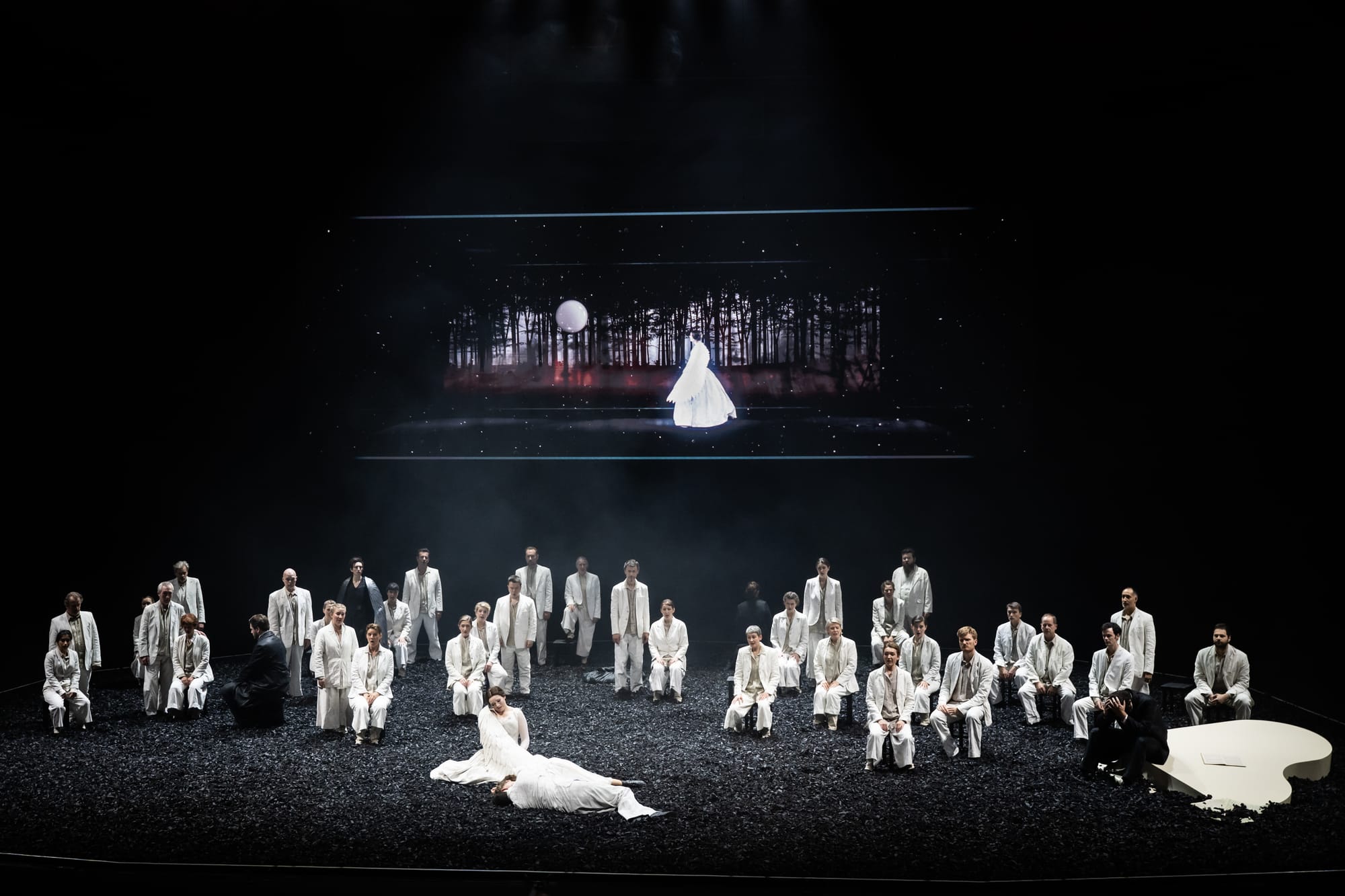
Schumann Das Paradies und die Peri, Op. 50 (1843) Mandy Friedrich (The Péri); Sebastian Kohlhepp (tenor); Agata Schmidt (alto); Samuel Hasselhorn (baritone); Clara Guilon (the young girl); Victoire Bunel (the angel); Julien Clément (Gazna); Lancelot Lamotte (the young man); Rosana Ribeio (choreography); , accentuis; Insula / Laurence Equilbey. La Seine Musicale, Paris, 17.05.2025
This was a performance of Schumann’s rarely-heard Das Paradies und die Peri, bookended by ‘Die Cappelle’ from Romances for Female Voices, Op. 69, and ‘John Anderson,’ from Romances and Ballads for chorus, Op. 67.
The chance to see Schumann’s Paradies is rare enough; to see it staged, even rarer. Although Rattle performed the piece in London relatively recently, it remains elusive; Rattle also performed it in London back in 2007 (with the OAE) although I genuinely believe the last time I heard it live was in 2001 (nearly a quarter of a century ago): the OAE again, this time under Mark Elder and with Christine Goerke (I believe making her UK debut), Mary Plazas, Bernarda Fink and Peter Auty. The recorded arena is more populous though: I hold a deep affection for Sinopoli’s Dresden recording (try this YouTube excerpt), and for the Düsseldorf Symphony Orchestra under Henryk Czyz on EMI, a 1973 recording at one point on EMI Double Forte coupled with a raft of useful Schumann choral music (and if the details put you off, look at the soloists there: Edda Moser, Brigitte Fassbaender, and Niicolai Gedda): my 2002 review is here.
Here though was a full staging of Paradies, complete with Insula’s trademark electronica, a screen on which is displayed a host (pardon the Heavenly pun) of relevant (sometimes obliquely so) images. Putting the ravishing ‘Die Capelle’ before the orchestral opening does take a bit of the edge off (Schumann’s beginning is cruelly exposed for the violins), and of course accenus is one of the first of choirs (they have recorded this piece).
There was a late change of soloist: Johanni van Oostrum was scheduled to sing the Peri but sickbess forced her withdrawal; Mandy Friedrich learned the staging in a very short time (it would have been impossible to know that; and the staging is involved, to say the least) Friedrich is allied to the opera at Stuttgart and has taken on roles such as Agathe (Freischütz, a role she will reprise in 2025 in Bregenz), and Fiordiligi (CosI) in Tokyo.
That exposed opening in the end introduced a world of magic – as is appropriate to the story, featuring the ‘Peri,’ a form of Persian fairy. Daniela Kerck’s staging left us in no doubt of this magical component, angel wings a definite part of her vocabulary. Liminal creatures, Peris exists somewhere between he human and the Heavenly ; they aspire to the celestial. The core idea of the piece is the opening of the gates of Heaven to our particular peri. The major addition/sleight was the composer Robert Schumann as narrator, brilliantly realised via costumerer Andrea Schmid-Futerer.It was Andreas Franck’s lighting that really created such atmosphere, though.
The idea for Schumann’s piece comes via an 1817 epic, Lalla Rookh by Thomas Moore. The deals that to enter paradise, the peri has to find a gift that all bring forgiveness. Her search is worldwide, literally. Along the way she meets Gazna, a tyrant. The key, though s a singleton’s tear of.a repentant sinner. For Schumann, the piece parked a new chapter of compositional ambition. This is a concert piece, a secular oratorio, the cries out for a staging.
A huge LED all centre-stage forms the focus, around which we see nation and (human) acting. The thread, though, is Schumann’s music, effortlessly conducted by Laurence Equilbey. If Insula were not initially on they finest form this particular early evening, Equilbey’s reading was effectively conveyed.
Mandy Friedrich was stunning Peri; it would literally be impossible to ell she was a stand-in. Her final stretch ‘Friend’ ewige Freunde’ flew freely as it should. Sebastian Kohlepp was the narrator/Schumann, confident of both voice and stage action, and brilliantly dressed as the composer (and, at one point, possessed of a baton. The interaction between narrator and groups of solo voices at ‘So sang she nail und Schwann der Flügel’ was a moment of magic as lines intertwined. Kohlepp is a fine, strong tenor, tireless and involved. I did find Agata Schmidt’s restraint appealing, her voice punished yet subtle. We met Sammuel Hasselhorn as the baton solo in Fauré’s Requiem, and he was just as impressive here. Victoire Bunel was a stunning Angel, her voice as pure as one might imagine for this role. The idea of a ‘missing wing’ for the Peri, brought to completion to the full complement in the final stages, is.nice one.
As Gazna, Julien Clément could have accorded the role a touch more heft. Clara Guillon and Lancelot Lamote as a young girl and young man respectively, acquitted themselves well. The frequent use of chorus meant accentus’ unfailing excellence acted like a thread though the performance; it was quite right they had the last word wth Schumann’s magnificent ‘John Anderon’ from his Op. 67.
Equilbey’s feeling for Romantic gesture, and specifically Schumann’s kind, is complete. Previous forays into Germanic repertoire include Weber’s Freischütz (unforgettable in Aix (fully staged) and memorable in London (semi-staged), but unfortunately only released as excerpts on disc. Paradies und die Peri is an impressive addition.
Incidentally, Mandy Friedrich’s new album, Traumglück, is fascinating, a combination of Dora Pejačević, Fauré, Viadot-Garcia and Richard Strauss.









